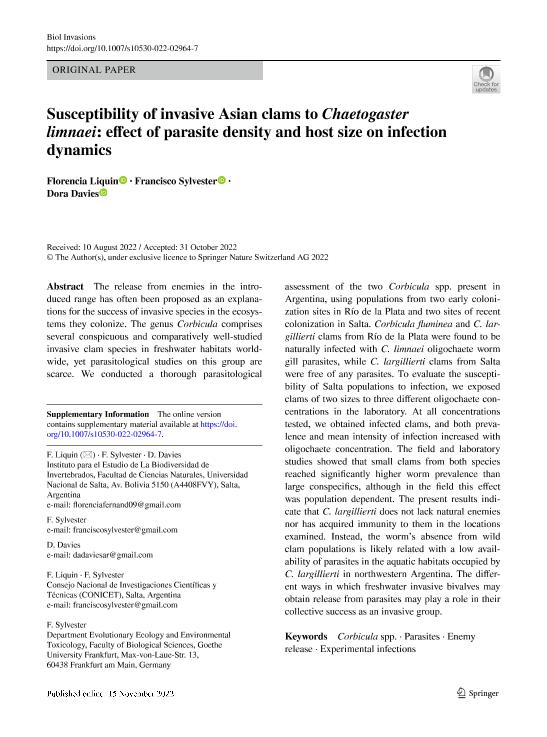Artículo
Susceptibility of invasive Asian clams to Chaetogaster limnaei: effect of parasite density and host size on infection dynamics
Fecha de publicación:
11/2022
Editorial:
Springer
Revista:
Biological Invasions
ISSN:
1387-3547
Idioma:
Inglés
Tipo de recurso:
Artículo publicado
Clasificación temática:
Resumen
The release from enemies in the introduced range has often been proposed as an explanations for the success of invasive species in the ecosystems they colonize. The genus Corbicula comprises several conspicuous and comparatively well-studied invasive clam species in freshwater habitats worldwide, yet parasitological studies on this group are scarce. We conducted a thorough parasitological assessment of the two Corbicula spp. present in Argentina, using populations from two early colonization sites in Río de la Plata and two sites of recent colonization in Salta. Corbicula fluminea and C. largillierti clams from Río de la Plata were found to be naturally infected with C. limnaei oligochaete worm gill parasites, while C. largillierti clams from Salta were free of any parasites. To evaluate the susceptibility of Salta populations to infection, we exposed clams of two sizes to three different oligochaete concentrations in the laboratory. At all concentrations tested, we obtained infected clams, and both prevalence and mean intensity of infection increased with oligochaete concentration. The field and laboratory studies showed that small clams from both species reached significantly higher worm prevalence than large conspecifics, although in the field this effect was population dependent. The present results indicate that C. largillierti does not lack natural enemies nor has acquired immunity to them in the locations examined. Instead, the worm's absence from wild clam populations is likely related with a low availability of parasites in the aquatic habitats occupied by C. largillierti in northwestern Argentina. The different ways in which freshwater invasive bivalves may obtain release from parasites may play a role in their collective success as an invasive group.
Palabras clave:
CORBICULA SPP
,
ENEMY RELEASE
,
EXPERIMENTAL INFECTIONS
,
PARASITES
Archivos asociados
Licencia
Identificadores
Colecciones
Articulos(CCT - SALTA-JUJUY)
Articulos de CTRO.CIENTIFICO TECNOL.CONICET - SALTA-JUJUY
Articulos de CTRO.CIENTIFICO TECNOL.CONICET - SALTA-JUJUY
Citación
Liquin, Florencia Fernanda; Sylvester, Francisco; Davies, Dora Ana; Susceptibility of invasive Asian clams to Chaetogaster limnaei: effect of parasite density and host size on infection dynamics; Springer; Biological Invasions; 25; 4; 11-2022; 1087-1099
Compartir
Altmétricas




